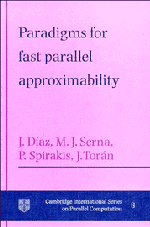Book contents
- Frontmatter
- Contents
- Preface
- 1 Introduction
- 2 Basic Concepts
- 3 Extremal Graph Properties
- 4 Rounding, Interval Partitioning and Separation
- 5 Primal-Dual Method
- 6 Graph Decomposition
- 7 Further Parallel Approximations
- 8 Non-Approximability
- 9 Syntactically Defined Classes
- Appendix 1 Definition of Problems
- Bibliography
- Author index
- Subject index
6 - Graph Decomposition
Published online by Cambridge University Press: 19 March 2010
- Frontmatter
- Contents
- Preface
- 1 Introduction
- 2 Basic Concepts
- 3 Extremal Graph Properties
- 4 Rounding, Interval Partitioning and Separation
- 5 Primal-Dual Method
- 6 Graph Decomposition
- 7 Further Parallel Approximations
- 8 Non-Approximability
- 9 Syntactically Defined Classes
- Appendix 1 Definition of Problems
- Bibliography
- Author index
- Subject index
Summary
For some graph problems, the fact of restricting the input to planar graphs simplifies the computational complexity of the problem. However, there are some NP-complete problems that remain NP-complete even when restricted to planar graphs, for instance the Maximum Independent Set problem (see [GJ79]). We have already mentioned in the introduction that to find a constant approximation to the problem of the Maximum Independent Set for a general graph with n vertices is as difficult as to find an approximation to the problem of finding a Maximum Clique, which means that unless P=NP, the Maximum Independent Set problem cannot be approximated within n1−ε [Has96].
Baker ([Bak83], [Bak94]) took advantage of a particular way of decomposing planar graphs to produce approximation schemes for some problems that for general graphs were difficult to approximate, among them the Maximum Independent Set problem. The idea of her method is, given a problem on a planar graph, to choose a fixed κ and decompose the graph into fcouterplanar graphs (see below for the basic definitions on planar graphs), then using dynamic programming techniques obtain the exact solution to the problem for each of the κ-outerplanar graphs. For each κ, an adequate decomposition of the graph into κ-outerplanar subgraphs gives a, κ/(κ + 1) approximation to the optimal. Moreover it could be implemented in polynomial time. Taking κ = O(c log n) where c is some constant, a Polynomial Time Approximation Scheme is obtained. Using the above technique, Baker was able to produce Polynomial Time Approximation Schemes for a set of problems on planar graphs. The most significant of them is the Maximum Independent Set problem.
- Type
- Chapter
- Information
- Paradigms for Fast Parallel Approximability , pp. 68 - 93Publisher: Cambridge University PressPrint publication year: 1997



